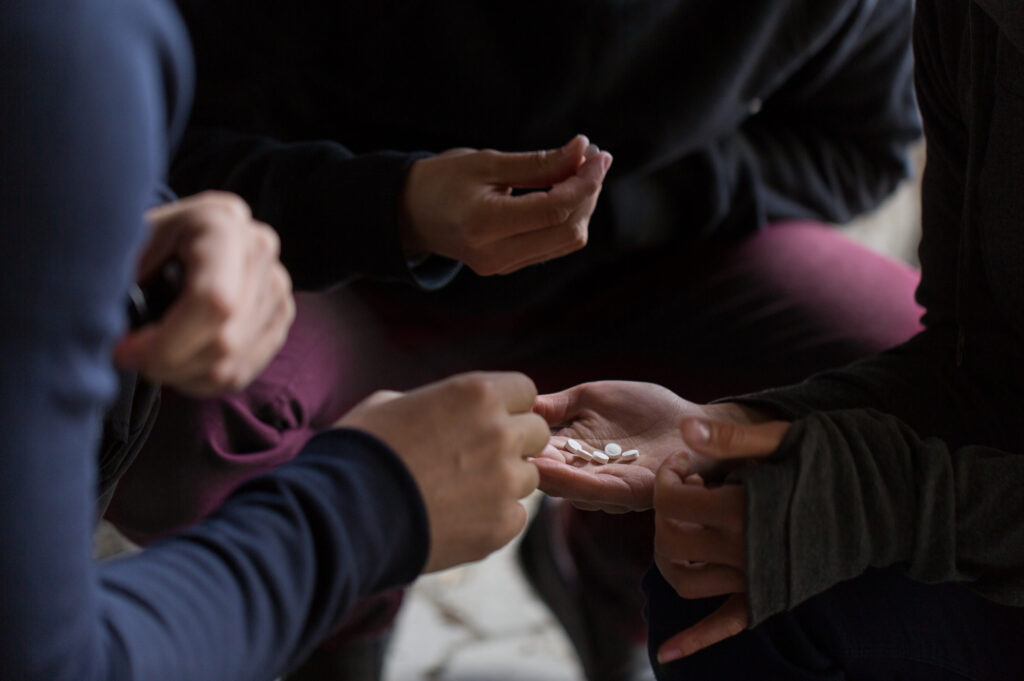If you’re a parent of a teen, it can be confusing when you hear your teen talk to others, or try to read their texts. If you’re not familiar with teen slang, some of their exchanges may seem unfamiliar or downright odd.
Adolescents today will also use words and phrases that mean totally different things than what you may think they mean. Many times, teen-speak can denote sexual- and drug-related innuendo. They’ll use these terms as teen secret code words to keep safe from prying parents’ eyes. Below are a few terms, and their definitions, to help you stay in the know—and take action if you see these terms being used in a suspicious way.
Note: the following texting exchanges are fictitious. They are not real nor based on anyone’s personal circumstance or experience. Any similarities or resemblance to real people or experiences are purely coincidental.
Teen Secret Code Words
Aunt Hazel
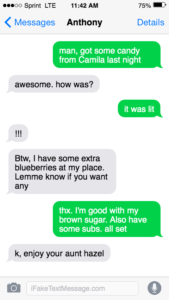
Don’t be fooled into thinking your adolescent is talking about snacking here. This conversation has nothing to do with food or visiting family members. (Especially if you don’t have a sister named Hazel.) Instead, it’s about illicit activity. Let’s decode this exchange here, phrase by phrase:
While “Candy” is code for crack cocaine or Ecstasy/MDMA/Molly, the phrase “getting some candy” can also refer to sexual activity. “It was lit” is teen-speak for “it was amazing.” When Anthony is offering your teen “blueberries,” he’s really offering prescription painkiller drug Percocet. This amphetamine/Oxycodone combination is also sometimes just called “blue” or “blue dynamite.” (Blues can also refer to fentanyl—an extremely dangerous drug.)
When your teen declines and says he’s good with his “brown sugar,” that means he has heroin. There are many street names for heroin depending on its appearance (e.g. Black tar, China white, or simply “brown”), although many teens just call heroin “dope.” “Subs” is short for Suboxone, the controversial drug that teens often abuse in medication-assisted treatment. While possessing and abusing heroin is bad enough, using Suboxone at the same time can lead to death. Anthony ends off by wishing him well with his “Aunt Hazel”—another code word for heroin. If this is your adolescent, it’s time to get them into a drug rehab center—immediately.
Netflix and Chill
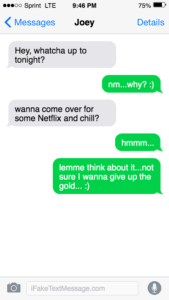
If you think the conversation to the right is referring to an innocent night of movies, you may want to think again. While the term “Netflix and chill” may have harmless origins, and probably once referred to an evening of binge-watching TV shows and movies with a friend on Netflix, the term nowadays is a euphemism for sexual-related activity. Or, to put it more bluntly, hooking up. And, lest you think your adolescent daughter is talking about frugality, “giving up the gold” has nothing to do with cash. Instead, it refers to giving up one’s virginity.
Bath Salts and Benzos
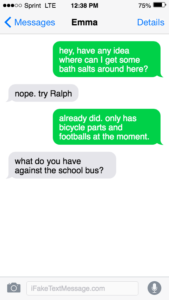
Unfortunately, your son or daughter may not be looking to have a relaxing DIY spa day. They’re referring instead to synthetic cathinones, more commonly known as bath salts. According to the NIH, these white- or brown-powdered drugs are psychoactive mind-altering substances that have similar effects to other stimulants such as methamphetamine and cocaine. In addition to the deceptively named “bath salt,” this drug can also be called “plant food,” “jewelry cleaner,” or “phone screen cleaner” to avoid detection by concerned parents.
When your teen is referring to “Ralph” selling “bicycle parts” and “footballs,” she’s really talking about Xanax. Xanax is one of the most commonly abused benzodiazepines (benzos). Its various nicknames refer to the different shapes the drug comes in. Taking a “yellow school bus” or “handlebar” refers to ingesting the yellow rectangular Xanax bars, while a “football” refers to an oval tablet. Physicians usually prescribe sedative benzos for anxiety, panic disorder, and other medical conditions, but many teens abuse the drug to achieve its euphoric effects. In particular, teens often combine benzodiazepines with alcohol or opiates. This is a deadly combination, even in small doses. While you might be relieved that your daughter isn’t interested in benzos, it’s still time to have a serious discussion about substance abuse.
California Sunshine
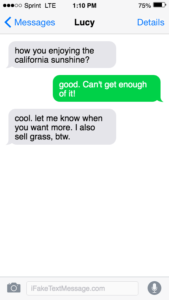
“California Sunshine” is really LSD, a hallucinogen popular among high schoolers. (In 2018, 5% of high school seniors said they’d tried LSD at least once in their life.) This drug causes mind-altering perceptions and sensations and causes mood-swings, frightening flashbacks, and can cause mental health issues long term. LSD is also sometimes called “acid” or “Lucy,” so if you see a suspicious-sounding conversation like this one in your adolescent’s phone with someone named Lucy, it’s time to confront them.
Grass
Lastly, you may be familiar with the term “grass”, a.k.a. “weed” or marijuana. Many believe marijuana, a common recreational drug, is harmless. This is a myth. It has the potential for devastating consequences when abused by adolescents and teens, and contrary to popular belief, it is addictive. Research shows that marijuana is especially addictive to those who start using it between ages 12-17. According to the NIH, the nearly 7% of high school seniors who smoke marijuana regularly are harming their developing brain and lowering their IQ.
Popular Teen Code Words for Sex
Here are some more teen sex code words.
- Sneaky Link – This refers to a secretive or clandestine meeting with someone for the purpose of engaging in sexual activity.
- DTF – An acronym indicating someone who is willing and eager to engage in sexual activity.
- Smash – Used to describe engaging in sexual intercourse, often in a casual or non-committal context.
- Hooking Up – A vague term referring to engaging in sexual activity, which could range from kissing to intercourse, depending on the context.
- NSA – Stands for “no strings attached,” indicating a sexual encounter without the expectation of a romantic relationship or commitment.
- Friends with Benefits (FWB) – Refers to a relationship where two people engage in sexual activity without being in a committed romantic relationship.
- Slide into DMs – Refers to sending a direct message (DM) on social media with the intention of initiating a romantic or sexual conversation.
Other Nicknames Teens Use for Drugs
If you’re wondering about other slang terms and code words adolescents use for drugs, check out this comprehensive report put out by the U.S. Drug Enforcement Administration (DEA). This Intelligence Report contains thousands of nicknames teens use for drugs of every class—including opiates, painkillers, hallucinogens, benzos, and more. And if your adolescent son or daughter, friend or loved one, is regularly using these terms, you may have reason to worry.
In 2018, almost 50% of 12th graders in America reported that they’ve tried an illicit drug at least once (2017 MTF survey). For many adolescents, it takes just a few drug experiences to get addicted. Substance abuse, especially the opioid crisis, is claiming thousands of teen lives in the U.S. every year.
Do you think your teen needs addiction help or mental health treatment?
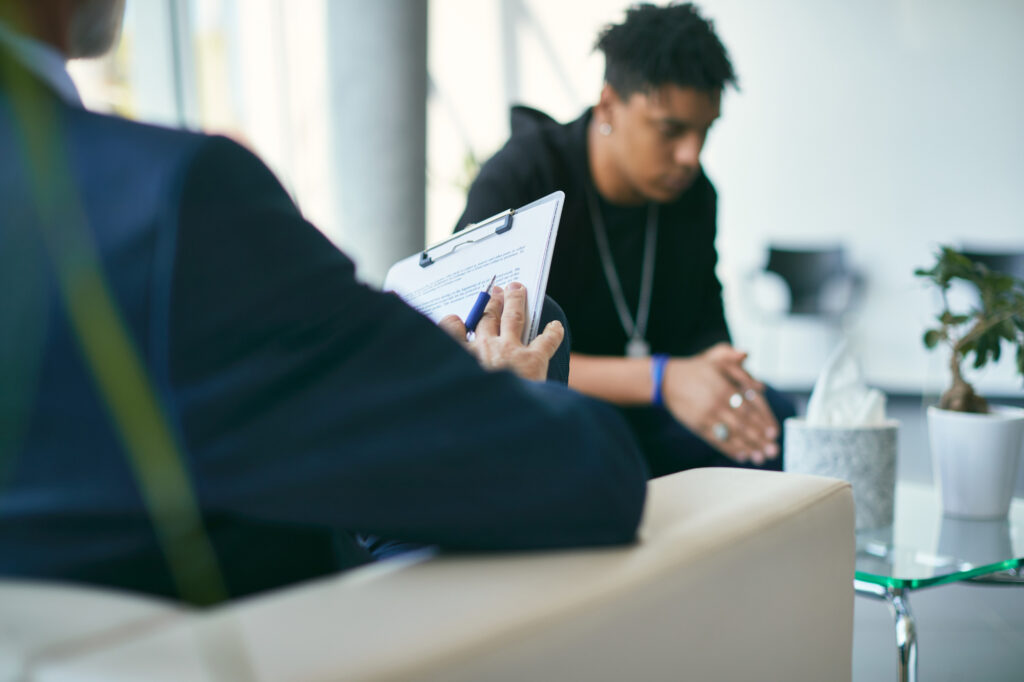
Many times, substance abuse goes hand in hand with mental health issues like depression, anxiety and/or trauma. Adolescents often use drugs as an escape from emotional pain. That’s why it is so necessary to get help from a mental health professional as soon as possible.
If your adolescent has tried stopping their drug use but realizes they can’t, it’s time to consider asking for help. The nature of addiction makes it almost physically impossible to stop using drugs on your own, without some support from a mental health professional. As a teen develops a physical dependence on the drug, their tolerance increases. They require more and more of the drug just to achieve the same high. Soon a teen may be using not even to get high, but because they feel they can’t live without it. For these reasons, you need to get your teen to a detox facility and adolescent drug rehabilitation program. There, they’ll learn how to achieve recovery from addiction.





























































